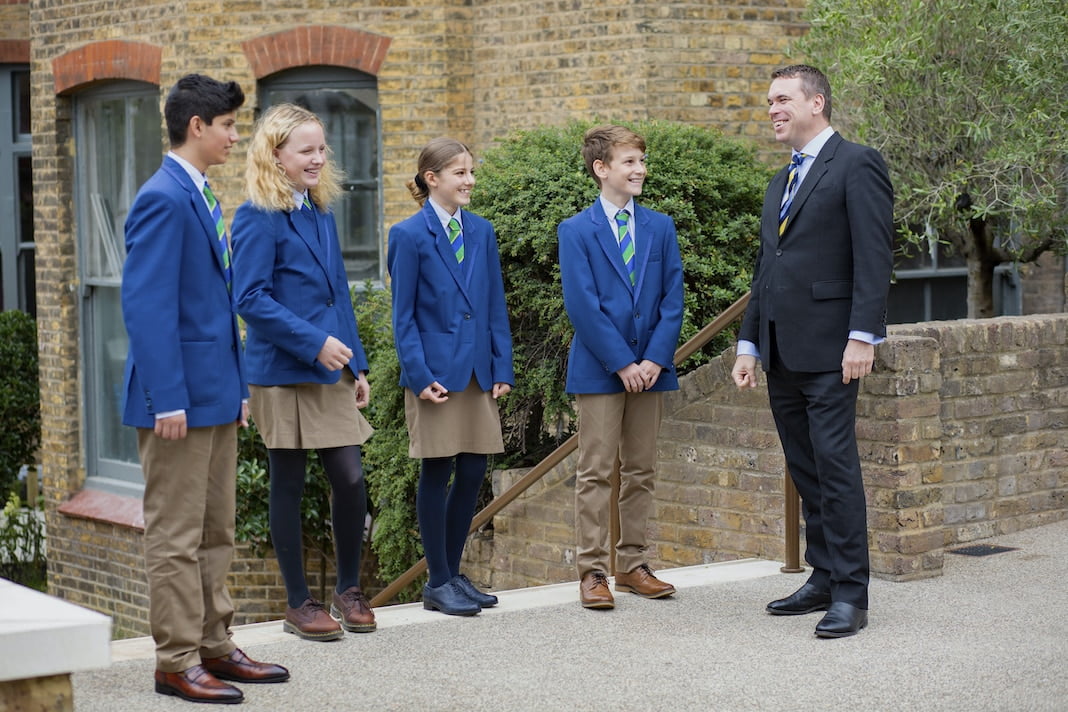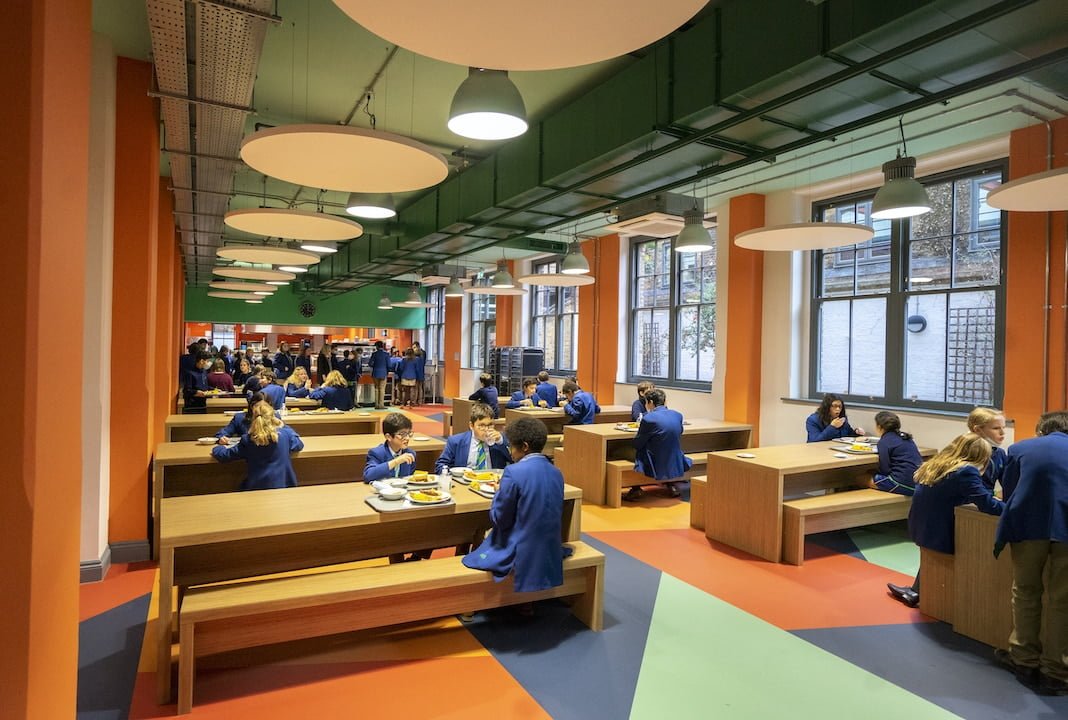Welcoming its first cohort in September 2020, Maida Vale School is a fresh addition to the London learning landscape. We find out more about its approach, and how this new school community is developing
On the face of it, 2020 was not an auspicious time to start anything new, yet that’s precisely what Maida Vale School did. The co-ed independent secondary located in Saltram Crescent – an enclave of Victorian villas between Maida Vale, Kensal Town and Queens Park stations – opened its sunshine-yellow doors to 50 pupils last September.
For Founding Headmaster Steven Winter, the pandemic meant a few supply issues back in the early months of 2020 when contractors were readying the school, but nothing to push well-laid plans off course. On the plus side, the team had a heads-up on what was likely to unfold. “We set up the school from day one to be able to go into remote learning,” he says. “Any lessons that had to be learnt were learnt before the school opened.”
This meant Maida Vale pupils were ready to rise to the challenge of digital. “They bought into our remote learning incredibly well,” says Winter. When school was physically open, the size of cohort relative to the space helped. “In many ways we could act more normally than many other schools,” he says. And there’s been an abundance of goodwill. “There’s been that camaraderie that comes with being part of a new community.” This includes parents as well as staff and pupils. “We were all much more forgiving of each other because we all understood that we were living in a slightly odd situation.”
“There’s been that camaraderie that comes with being part of a new community”
It helped that Maida Vale School had been a long time in the making and with a clear strategy for putting down strong roots. It’s also gained strength from being part of the family-owned Gardener Schools Group – joining three well-established schools in London. So that begs the question, why this location? Winter says one good reason was the number of pupils at sister secondary Kew House travelling from this part of London. “There isn’t an independent co-ed senior school within two to three miles of us so we are serving a community that would really like their children to go co-ed.”
Already, the geographic range of its cohort is becoming clear. “We’re starting to see our catchment area define itself – Willesden and Harlesden to the west, the Kensals and Queen’s Park to the north and to the east of us St John’s Wood and Hampstead. Also, pupils are coming from Notting Hill to the west.” Local feeder schools have been very supportive. In April Gardener Schools Group announced to parents that it now offers through school. This means pupils at Ravenscourt Park and Kew Green preps have a guaranteed place at Maida Vale or Kew House provided that their individual learning needs can be met.

The four school Heads are close knit and collegiate – for instance, Steven Winter and Will Williams over at Kew House talk several times each week – so that perspectives and ideas get shared. Parents will spot that all four schools sport the same vibrant blue within their uniform (although each uniform has its own unique identity). What they might not realise is that Maria Gardener, the Group’s founder and Director of Education, still teaches a lesson in both senior schools every week. Winter says this helps to “root her experience” from a pupil perspective, adding: “I think that’s something that says a great deal about the Group”.
Maida Vale started small deliberately – the 50 pupils that joined in years 7, 8 and 9 swelled to 66 by the end of the first school year. This September there are 120 pupils enrolled. It is all part of a strategy to grow the school and its culture from the ground up. The first sixth form entry is not until 2023 and it will be managed to avoid overwhelming those students who have journeyed through the school. “While we will allow some sixth form entry in 2023, it won’t be large,” says Winter. Ultimately, the school will have a roll of approximately 600.
No doubt the 16+ cohort considering Maida Vale will be attracted by the Independent Learning Centre and Sixth Form Terrace. But the whole Victorian building has been remodelled to offer 21st-century learning spaces. Previously it was a college building (originally built as Paddington Technical Institute) and those large rooms, high ceilings and big windows were crying out for bold architectural thinking. Now there are multiple science labs and music suites, along with computer lab, CAD/CAM, art, design and food technology rooms. There is a terrific theatre (Wizard of Oz, became a whole-school production and was a highlight of the first school year). There are also dance and fitness studios, Astroturf pitch, basketball court and breakout zones.

Another thing that feels distinctly modern is the open-door policy for parents, with a swish Parent Café, along with a programme of friends’ events, workshops and talks. Building a sense of togetherness is integral to the school ethos – community responsibility is one its pastoral values (along with mutual respect, tolerance and compassion). The school also sets out its stall on learning values (resilience, creativity & problem solving, supporting & inspiring others and reflection) and these twin sets of principles provide clear language applied to every endeavour. “Values led education is nothing new – it’s a big thing in the States – but it was a great opportunity for us to do it really well and to do it in a way that would see young people through the challenges of global living,” says Winter. So why are front-and-centre school values so important? “We’ve then got a shared language that we can use all the time,” he says. “Pupils understand their role in that language, and they understand their role in our community.”
“The strategy is to grow the school culture from the ground up – the first sixth form entry is not until 2023”
Winter has seen values-led approaches at work, and he’s made them work. While at Felsted he was ‘loaned’ to Richmond Park Academy and says he learned a lot there about leadership. Most recently, he was Deputy at Bethany School in Kent – rated among the top 0.5% nationally for pupil progress at A level by the time he left – and his time there taught him that good pastoral care and progress go hand in hand. “If you put all the procedures in place – tracking strategies, and so on – and you make sure pastoral care is really effective, then pupils know they are supported and can really fly.”
When it comes to the curriculum, perhaps the most innovative approach at Maida Vale is in the design of the school day. There are six hours of lessons – as opposed to the typical five – thanks to a timetable built round four 90-minute lessons a day. This saves a lot of time between lessons (the school has calculated about an hour a day) but also gives time for more rounded learning journeys. “There’s time to really explore subjects, to focus and question, but also time to consolidate and make sure that before that you’ve left that lesson you’ve fully understood – It has not just been a drive by.”
When it comes to homework, it’s shorter (and much sweeter for pupils) with 40 minutes a night for the youngest. Winter reassures those parents who think more is better when it comes to homework. “I say to them: ‘What I really want for years 7 and 8 is that they buy into our enrichment’.” Young people enjoy the full gamut of clubs – from sports, languages and drama to coding, cooking and classical guitar. The emphasis on extracurricular ties in perfectly with a school ethos of nurturing not hothousing. “What do we want for young people? We want them to be able to build really good relationships, to find things they are really passionate about and to go out into the world knowing what work-life balance looks like,” says Steven Winter. “What more could you ask for?”
Further reading: Celebrating new openings at St Dunstan’s
You may also like...

























